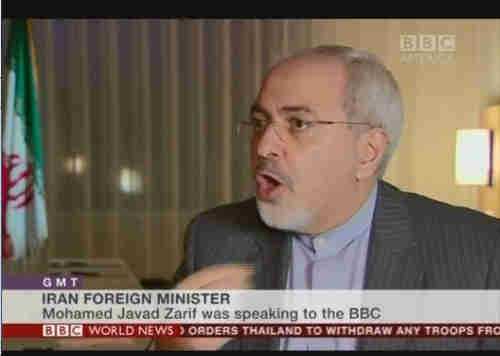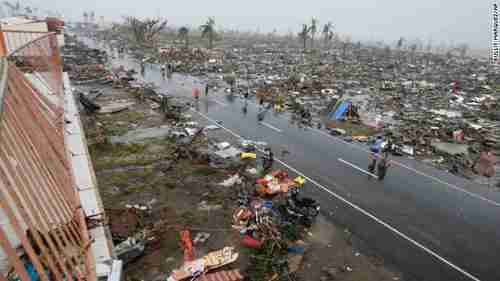This morning's key headlines from GenerationalDynamics.com
- Iran's statement on Syria shows signs of desperation
- U.S. Marines land in Philippines after massive Typhoon Haiyan destruction
Iran's statement on Syria shows signs of desperation

Mohamed Javad Zarif being interviewed on BBC on Monday
Zarif began the interview by parroting the usual line -- there is no military solution, there has to be a political solution -- not mentioning that Iran is fully involved militarily in Syria. Then, the BBC interviewer, Jeremy Bowen, asked about the role of jihadists in Syria (my transcription):
That is a threat to all of us. The role of jihadists, the role of extremists, these are a band of mobile people, most of them non-Syrian, who are moving from Chechnya to Afghanistan to Yemen, the [next] day to Iraq to Syria, and wreaking havoc in all these countries. It's in the interest of everybody to understand that extremists will not be able to be contained in one country. If they give rise to extremism, this is a fire that will engulf them and will burn them. We've got to understand that extremism has no boundaries. Terrorism has no boundaries. We need to collectively deal with them thru serious measures to prevent them from wreaking havoc.This is exactly the point that I've been making for months, except that I place the blame squarely on Iran and Russia. Iran and Russia have been supplying fighters and weapons to Shia/Alawite Bashar al-Assad, who is trying to exterminate all the Sunnis in Syria. So of course the Sunni jihadists from countries near and far are going to flock to Syria to fight al-Assad. Are the Iranian and Russian leaders so incredibly stupid that they didn't think that would happen? Apparently so. But that's typical of the utter stupidity of many politicians in many countries.
As I've said in the past, I believe that a tipping point has already been reached in Syria, and that there's no way to stop the rising sectarian conflict in the Mideast. With hundreds of thousands of deaths, and many millions of refugees, the countries around Syria are now so destabilized that there's no way to recover without a full-scale war.
At this point, Bowen said that the war in Syria has increased Sunni/Shia tensions. He asked Zarif how serious this sectarian tension is for the Mideast and the world:
I think it's probably the most serious security threat not only to the region, but to the world at large. And I think all of us, and Iran is committed to this and when I was in Turkey with our Turkish friends, regardless of our differences over Syria, we need to work together on this sectarian issue.
When I was in Iraq we agreed with the Iraqi friends that we need to work together, that this was the single most important problem that we all - we ALL face. And I believe we can work with everybody in the region, with Saudi Arabia, with the countries in the Persian Gulf, with other countries in the region, with others, in order to contain this threat, because this -- some people have fanned the animosity for short-sighted political interests."At this point, Bowen interrupted and said, "Saudis - you mean the Saudis." Zarif was obviously talking about Iran's hated enemy, the Saudis, but refused to say so.
The more that Zarif spoke, the more his words rang hollow. Iran not only has NOT been working to "contain this threat," but in fact Iran has been the principal cause, along with Russia, of the sectarian threat.
Iran's economy is on the ropes because of the international sanctions, while Saudi Arabia has an almost unlimited amount of money to fund anti-Assad fighters in Syria. (See "11-Nov-13 World View -- Saudi Arabia's plans for Syria intervention face many obstacles")
So now Zarif is whining that the Saudis have "fanned the animosity for short-sighted political interests," ignoring that's what Iran has been doing for years.
I'm talking about certain countries that have called various names about Shia Crescent, and all of that -- this business of fear-mongering has been a prevalent business. I think we need to come to understand that sectarian divide in the Islamic world is a threat to all of us. Nobody can benefit from it. Nobody should try to fan the flames of sectarian violence. I think we should all rein this divide, and rein it in, bring it to a close, try to avoid a conflict that would be detrimental to everybody's security.By this time, Zarif sounded completely desperate. Iran has been fanning the flames of sectarian violence in Syria since the war started 2 1/2 years ago, and now it's blown back on them. The wealthy Saudis are gearing up for a fight, the bankrupt Iranians can't compete, and Sunni jihadists are striking within Iran itself.
For 30 years, Iran has been funding and fomenting terror throughout the Mideast and, through Hezbollah, around the world. Iran's desperation is well deserved. Even worse, the survival of the regime is at stake, with Iran in a generational Awakening era and the younger generations getting very impatient with old hardline geezers running the country.
The question is how much of a change in policy can be expected from this desperation. The nuclear talks this past weekend collapsed, but there also Iran seemed almost desperate to reach an agreement that would get the sanctions eased.
There's a final word to be said about Hezbollah. The sectarian conflict really spiked up last April when Hezbollah announced that it would be invading Syria to fight on the side of al-Assad. Reports indicated that Hezbollah leadership didn't want to intervene, but was forced to by their masters, the Iranians. (See "27-Sep-13 World View -- How Hezbollah's reluctant foray into Syria changed the Mideast")
Analysts have noticed that, without any particular announcement, Hezbollah withdrew from Syria a couple of months ago. This reflects a change in policy of Hezbollah, but more so of Iran. That could be the first sign that Iran is finally realizing the disaster that it has caused working with Russia. BBC
U.S. Marines land in Philippines after massive Typhoon Haiyan destruction

The city of Tacloban in the Philippines, with a population of over 220,000, almost totally destroyed by Typhoon Haiyan
The nation is used to typhoons, having had 20 or so already this year, but no one was prepared for Haiyan, with 145 mile per hour winds and storm surges as high as 20 feet. Haiyan killed over 10,000 people and completely destroyed cities in its path. Almost 9.7 million people were affected.
A new typhoon, named Zoraida, will make landfall on Tuesday, with top winds of 34 miles per hour but with plenty of new rain to add to the misery. The U.S. is providing $20 million in aid to the Philippines, and the aircraft carrier USS George Washington, currently in Hong Kong, is making final preparations to deploy to the Philippines and will arrive Wednesday or Thursday. President Benigno Aquino III has declared a "state of calamity." Fox News and Bloomberg
KEYS: Generational Dynamics, Iran, Mohamed Javad Zarif, Syria, Bashar al-Assad, Hezbollah, Saudi Arabia, Philippines, Tacloban, Typhoon Yolanda, Typhoon Haiyan, Typhoon Zoraida, Benigno Aquino III, USS George Washington
Permanent web link to this article
Receive daily World View columns by e-mail
No comments:
Post a Comment